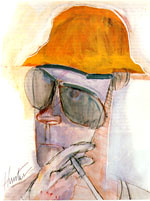Where the Buffalo Roam: RIP, Hunter
Hunter S. Thompson put a bullet in his head yesterday.
He'd long stopped being the writer he once was, but Thompson, at his finest, changed the world of journalism and opinion writing.
There was something tragic about Hunter from the mid-'80s on. I've written about opinion writing before. It's a hard life. Thompson ending his life this way echoes that. As an opinion writer, your life is largely spent hoping that the people you write about, the world you write about, will improve under your watch. Thompson's world didn't improve.
In fact, the America of today is the America he's been fighting to change for decades. The re-election of Bush was a monumental victory for the religious right, and a crushing blow to true "freedom lovers." The result of that election and the continued erosion of moral freedom in the US must have been a horrendous reality check for the author's infamous alter-ego, Raoul Duke.
Thompson, a diehard Democrat all his life, lived and breathed politics. He always had a dream of what America could be, and spent his life lamenting the failure of his nation to ever measure up to his dream of it. The one time in the last 15 years that the Thompson of old was able to revisit the spark and venom that made his early writings so wildly original was in 1995, upon the death of Nixon.
Nixon, Thompson wrote, "was the man who broke the back of the American Dream." The president was so twisted he required two aides "to screw his pants on in the morning." Tricky Dick was Hunter's ultimate nemesis. As the cliched lying cheat of a politician, Nixon stood for everything Thompson loathed. The author never forgave the President for orchestrating the Kent State shootings, and a lifelong animosity was formed.
Thompson was a part of the newly political youth movement that spawned demonstrations like the one that led to the shootings. Kent State is widely accepted as the beginning of the end for the hippies, and Thompson was a casualty of that time. His jaded cynicism paved the way for a new kind of journalism--Gonzo journalism. The Gonzo journalist shuns the illusion of objectivity, and absolutely embraces the subjective. They tend to mix fact with fiction for effectiveness--all part of of the natural order, as far as Gonzo journalism is concerned.
The author's lit career lifted off with a violent fury when Fear and Loathing in Las Vegas was serialized in Rolling Stone magazine. In 1972, he then followed McGovern on campaign and produced a brilliant book from the installments: Fear and Loathing: On the Campaign Trail '72 became one of the most shocking publications of the year, and forever impacted both campaign coverage and politics.
I was 18 when a friend introduced me to Fear and Loathing in Las Vegas. When those words, "We were somewhere around Barstow on the edge of the desert when the drugs began to take hold..." rolled off the page and into my psyche, it began a long relationship with the Good Doctor.
When Nixon died in the mid-'90s, Thompson lost his last great nemesis, and many of us suspected that he'd probably never be the same kind of literary power he once was. Then all the retrospectives began coming out--his lifelong labour of fictionnal love, The Rum Diaries, the compilations of his letters in The Lost Highway, and his preference in his last few years to write only of sports... something he loved, but could never hurt him, unlike his passion for American politics. It seemed to me like there was an expiration date looming for the lit icon, but I could only hope to be wrong.
I can't point to many writers and say, "He is why I learned to write." But early Hunter S. Thompson is definitely at the top of that very, very short list. I am not given to idolizing people, but for a time, he was one of mine.




<< Home